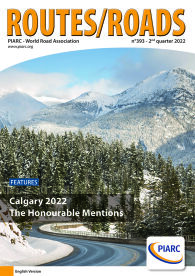Features
Artificial intelligence Surface Temperature Prediction Model
In a mild climate where temperatures are often close to freezing, determining which parts of a road network should be salted on a given night is challenging. Accurate, granular forecasts of road conditions are needed to avoid unnecessary salting whilst maintaining safety. We present an Al road surface temperature prediction model trained using data from a network of 112 sensors across Kent in the Southeast of England. Using weather forecasts and location specific features (elevation, road type, population density, traffic volume etc.) the model was able to predict road surface temperatures 24 hours in advance with over 90% accuracy and mean absolute error of 12C. We demonstrate how the model can be used to predict temperatures across a network of salting routes and we use a clustering algorithm to identify roads that freeze in similar conditions and suggest new domain boundaries for those routes. The optimised domains will be trialled for the 2020/21 winter salting season and should improve the effectiveness of salting decisions. We discuss how the Al model could be used to produce granular route-based predictions and how these could be incorporated into a decision support tool to improve efficiency further.
